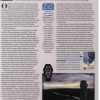The Guardian last month on Orwell and women:
George Orwell’s first wife, Eileen O’Shaughnessy, made his work possible at the cost of her own by taking on the household drudgery and typing up his writing instead of completing her master’s in psychology. But Wifedom, a remarkable new book by Anna Funder, shows there was much more to a woman who appears only fleetingly in her husband’s work and is poorly served by his biographers. Shortly before meeting Orwell she wrote a dystopian poem titled End of the Century, 1984; she suggested that he write an animal fable instead of an essay denouncing Stalinism; and she noted her husband’s “extraordinary political simplicity”. In Homage to Catalonia, Orwell mentions a shopping trip they make to buy stockings in Barcelona – but not that she had a political job in the offices of Poum (the Workers’ Party of Marxist Unification), for whom he fought in the civil war; nor that she took significant risks to get them and others out of the country after Stalin ordered his men to liquidate the party. She took risks, too, to save the manuscript.
But she was a woman, so he couldn’t really see her. He was one of those men.
Funder greatly admires Orwell’s work; she does not want it to be “cancelled” by her unflattering portrait of him, especially his shoddy treatment of his wife. But she also notes that O’Shaughnessy “has been cancelled already – by patriarchy”; that is, “buried first by domesticity, and then by history”. Funder says she writes for the same reasons Orwell himself gave – “because there is some lie that I want to expose, some fact to which I want to draw attention”…
“Women have always been 50% of the population, but only occupy about 0.5% of recorded history,” the historian Dr Bettany Hughes has observed. Even those who are remembered, she notes, “aren’t allowed to be characters … they have to be stereotypes”: Cleopatra is remembered as a seductress, not for her talents in maths and philosophy.
That’s what I mean by not really seeing. Women are like shadows, ghosts, passing thoughts. They don’t matter much. They have little substance. Nobody cares. (“Nobody” of course means “no men” – women don’t get to be anybody or somebody. Neutral nouns of that kind refer to generic men, not generic people.)

